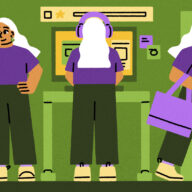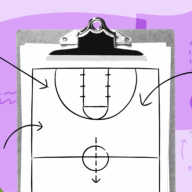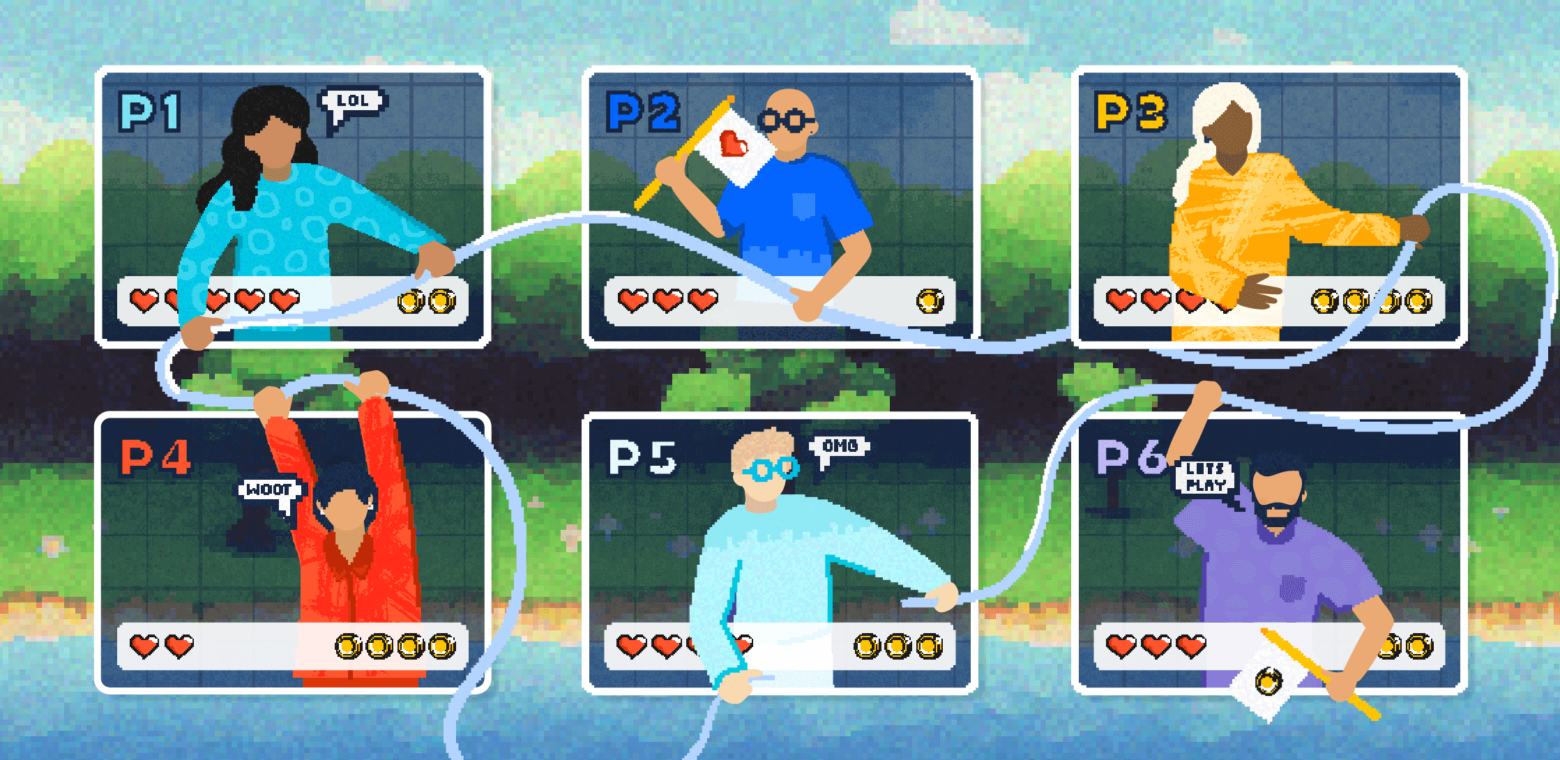Video games can help your team work smarter (no, seriously)
Attention, managers: by the end of this article, we’ll have you slaying dragons with your direct reports in the name of team harmony.
5-second summary
Somewhere in the evolving zeitgeist of the last few decades, video games got a bad rap. The prevailing narrative is of concerned parents hovering over their pale, pubescent sons and daughters as they decay in dark basements in front of flickering screens. Zoom out much further, and it’s apparent that video games have fallen victim to the same technopanic that telephones, radios, and even books once did. (Remember learning about the controversial invention of the printing press?)
To this we say – forgive us – okay, boomers. It’s time we put the tired myth of games as zombie-creators to rest, and embrace the ever-growing body of work that tells us video games can and do teach us valuable skills – and can even help people work better together. So says the science, and the experts.
Managers, take note: team video gaming can be a great way to engage and enrich your colleagues, especially in a time when real-world, in-person bonding opportunities may still be scarce. Here’s how games can foster healthy, effective teams, and how you can make a distributed game night happen.
Video games can be good for teams, according to science
Games are pretty much synonymous with fun. Nobody questions the value of a long-standing poker night, laser tag tradition, what have you – but what are those if not socially sanctioned team-building exercises? So the question is, how can team-building within the confines of a game (and in a virtual environment, at that) help you do your best work?
For one, game play often mirrors the kinds of interactions that help people work better together in the first place, like pursuing mutual goals, allocating shared resources, negotiating task ownership, and collaborating to solve problems. A Brigham Young University study of 80 newly formed teams found that groups that played video games together for just 45 minutes were 20 percent more productive than those that engaged in more traditional team-building exercises. Notably, this was true for novices and avid players alike.
Workplace gaming also offers significant community-building value. It’s an intuitive notion that doing fun stuff with our coworkers is good for morale, and that strong interpersonal connections are an important ingredient for more effective teamwork. “Playing games with someone means interacting in a different space. You’re making an agreement with them to navigate that space together, and you’ll see a different side of them than you normally would in a professional setting,” says Matt Parker, professor at the New York University Game Center.
Game scenarios often mimic common team structures, too, where individuals each play a unique role in achieving a common goal. “Virtual [gaming] communities … not only benefit by each person fulfilling their particular role, but also by each person using the collective intelligence of the community to learn more about their role and the roles of others,” states Diana Hubbard, Ph.D., in a research paper on how gamers work together beyond gaming environments.
Tim Lamphier, a lifelong game enthusiast and an active broadcaster on Twitch, a streaming platform for gamers, agrees. “You’re constantly negotiating as a team,” he says. “I’m more of a jack-of-all-trades captain-type. I’m good at strategy and group play. And then certain people are better at the functional playing of the game, so I set them up.” The bottom line, for workplace and in-game teams: “If you’re not working together, you just lose.”
Research says gaming has positive effects for individuals, too
And beyond those group-level benefits, digital games can help your career on an individual level. There’s lots of evidence that playing games can boost universally desired skills, like literacy, creativity, and communication, not to mention more specialized proficiencies like spacial reasoning (Tetris, anyone?) and general tech readiness. But playing games can also instill an aptitude for those on-your-resume skills so many employers like to see, including leadership, budgeting, problem-solving, and strategic thinking.
Lamphier draws a direct line between his dedication to video games and his penchant for adapting to new concepts and situations quickly. Thanks in large part to playing games, he says, “I’m a really fast learner in general, whether it’s a sport or a language … I kind of start in the middle when I learn something new, and I can see how everything fits together really quickly.” Navigating unfamiliar virtual territory (think an alien-planet battlefield) or solving puzzles under time pressure flexes those strategic muscles, essentially teaching you new ways of thinking. “My cumulative knowledge is more dynamic,” Lamphier says.
TEAMS THAT RAID TOGETHER, SLAY TOGETHER: SPOTLIGHT ON WOW
With nearly 100 million players worldwide, World of Warcraft (Wow) is sort of the OG MMORPG (Massively Multiplayer Online Role-Playing Game). Since its release in 2004, it’s been unseated as the world’s most popular game many times over, but is perhaps the most-studied digital game from a standpoint of team effectiveness.
A study from Missouri University of Science and Technology found that WoW gamers who were successful working as a team in “raids” had qualities that psychological studies have shown are correlated with success on virtual workplace teams. “The more achievements you have in-game, the more technology savvy you are in real life. And that’s a good thing, especially in virtual communication teams and workplaces,” researchers explained.
Managers, here’s how you can make it happen
Primed for some collaborative video gaming with your team? It can be hard to know where to start, but we asked our guest expert in all things game-related, Matt Parker, to break it down for you.
Keep in mind the personalities and level of enthusiasm of your participants. Parker says, “Different people like different types of games. Not everyone is going to want to dig into a super challenging system, and others will welcome that challenge. So you should choose the kind of experience that appeals most to your group of players.”
The recommendations below all offer valuable team-building potential (most, but not all, are collaborative), and can be played on devices that pretty much everyone has access to. You could also consider distributing Android or Apple gift cards (or credits to Steam, a well-established video game marketplace) to help teams facilitate group gameplay.
PROFESSOR PARKER’S RECS
Among Us (PC, Android, iOS): This wildly popular, easy-to-learn game is mostly collaborative – but watch out for the imposter.
Tabletopia (Mac, PC, iOS, Android) and Board Game Arena (browser-based): each offer a wide variety of board games in digital form.
Jackbox games (available on a wide variety of platforms): these “couch co-op” party games were originally intended for co-located gaming, but can easily be played using a virtual chat tool. Parker recommends Drawful 2, Quiplash, and Fibbage, in particular.
Spaceteam (iOS + Android): described as “a game of cooperative shouting,” Spaceteam is an easily accessible, fast-paced cacophony of mission-critical commands like “Set clip-jawed monodish to six!” or “Extend the optical cushion!”
Overcooked 2 (Mac + PC): Collaborate with teammates in this chaotic but light-hearted cooking game.
Don’t Starve Together (available on a wide variety of platforms): on the heavier end of the spectrum, this collaborative game is particularly immersive, and also takes awhile to play.
Looking for more ways to boost team cohesion from afar? Read our blog highlighting the best virtual team building activities in the biz.













































